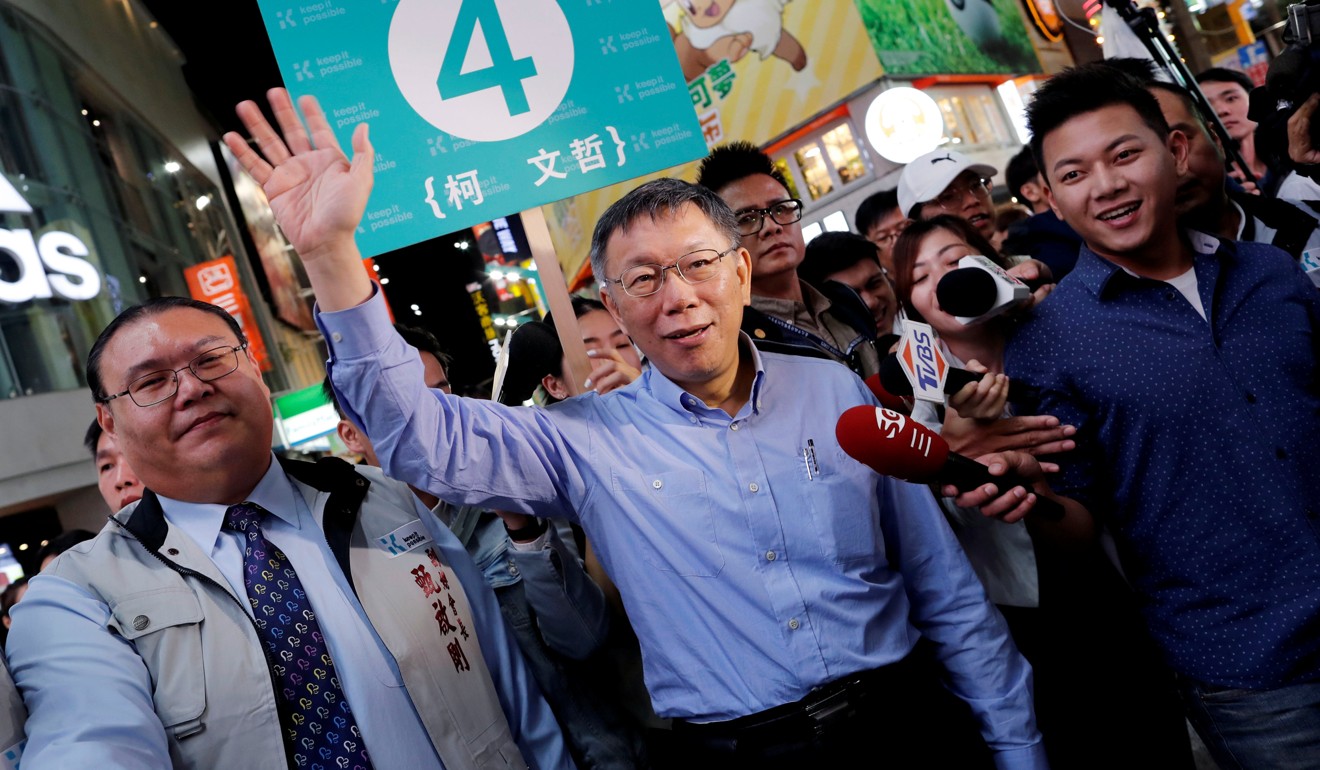
Taiwan’s name and president are in the balance as 19 million voters go to the polls
- Island-wide elections, with more than 10,000 seats up for grabs, are likely to provide a bellwether for President Tsai Ing-wen’s chances of re-election in 2020
- One of 10 referendums held the same day will decide if the self-ruled island should lose its ‘Chinese-Taipei’ tag at international sporting events
Taiwanese voters will go to the polls on Saturday to elect thousands of local leaders as the self-ruled island becomes an increasingly significant feature of the growing regional tensions between Beijing and Washington.
Since the official campaigns for the 9-in-1 polls – where nine elections are held on the same day – and 10 referendums, got under way this month, observers in the United States and across China have maintained a close watch for clues as to how their outcome might affect the highly sensitive Beijing-Washington-Taipei relationship, analysts said.
More than 19 million voters will cast their ballots at almost 16,000 polling stations across the island to appoint more than 10,000 officials, including the mayors of the six special municipalities of Taipei, New Taipei, Taoyuan, Taichung, Tainan and Kaohsiung.
Also up for grabs are the positions of 16 county and city commissioners, 900 councillors and 9,400 officials with various local grass-roots organisations.

The electorate will also vote in 10 referendums, with perhaps the most sensitive being a proposal to change the island’s official name in international sporting events from “Chinese-Taipei” to “Taiwan”.
The others cover a range of issues, including gay rights, sex education in schools, energy and pollution, according to the island’s Central Election Commission.
Taiwan name-change backers hit out at International Olympic Committee warning
“Needless to say, the name change referendum will rile Beijing, which is believed to have been trying to do all it can to hamper the vote,” said Liao Da-chi, a professor of political science at National Sun Yat-sen University in Kaohsiung.
Since the campaign to have the name changed began earlier in the year, the International Olympic Committee has three times warned Taipei of the possible consequences of the vote, saying it may result in the island being stripped off its right to take part in international events.
Analysts have said the warnings were likely made in response to pressure from mainland China.
Beijing tells Taiwan to halt all spying and ‘sabotage’ in mainland China
Beijing considers Taiwan a breakaway province awaiting reunification, by force if necessary. It has suspended exchanges with it since Tsai Ing-wen of the independence-leaning Democratic Progressive Party (DPP) was elected president in 2016 and refused to accept the one-China principle.

Analysts said Beijing was paying special attention to the local elections as they would provide an indication of how Tsai was regarded among the voters and whether she was still in the running for re-election in 2020.
The DPP currently controls four of the six special municipalities, and nine counties and cities.
“Tsai would have to bow out as DPP chairwoman if the party lost in Kaohsiung and Taichung,” said Wang Kung-yi, a professor of political science at Chinese Culture University in Taipei. “If that is the case, she might lose her re-election bid too as hard-core [independence] supporters have long wanted Premier William Lai to run for president.”
United States ‘won’t give in to China’ on Taiwan or South China Sea
Lai has openly stated his pro-independence stance, while Tsai is regarded by some groups as being too soft on Beijing and unwilling to push for an official name change for the island, from Republic of China to Taiwan.
While Tsai has refused to accept the one-China principle, she has also called for the peaceful development of cross-strait relations and maintenance of the status quo.
Yao Chia-wen, a presidential adviser and leader of the hard-core camp, said if the DPP lost Kaohsiung, Tsai would be forced to step down.
While the southern municipality has traditionally been a stronghold for the DPP, its mayoral candidate this time around, Chen Chi-mai, has faced a fierce challenge from Han Kuo-yu of the opposition Kuomintang (KMT).
Almost unknown to voters just months ago, Han has built his campaign on slogans such as “Make Kaohsiung great again” and in doing so won significant support, especially among younger voters. His popularity has even bolstered the campaigns of the KMT candidates running in Taichung, Taipei and New Taipei City.
The fall and rise of Taiwan’s Han Kuo-yu: a former Kuomintang outcast turns up the heat
The DPP has sought to negate Han’s rise by pointing to his close family links to the mainland and urging the electorate to save Taiwan from Beijing’s bullying.
Han and other members of the KMT have even been accused of being funded by Beijing, a charge he has denied.
During her campaign rally in Chiayi, Tsai said: “There have been strong voices and actions in raising support, and there have been many messages spread, but we all must elect the person who can work for the people’s interest.”
Tsai has made repeated claims that Beijing was trying to disrupt Taiwan’s elections and urged the electorate to use their ballots to “allow the best qualities of Taiwan’s democracy to be continued”.
Her allegations have been supported by US officials, including Vice-President Mike Pence, who have accused Beijing of spreading disinformation as a way to influence Taiwan’s voters.
European firms counting the cost of icy Beijing-Taipei relations, chamber of commerce says
“Obviously the local elections are not only a competition between Taipei and Beijing, but also between the US and China,” said Fan Shih-ping, professor of political science at National Normal University.
If the DPP lost Kaohsiung, it would raise serious questions about Tsai’s re-election bid, he said.
“This may abet the KMT’s chances in the 2020 poll, and allow Beijing to take back control of Taiwan via the KMT’s mainland-friendly policy.”

